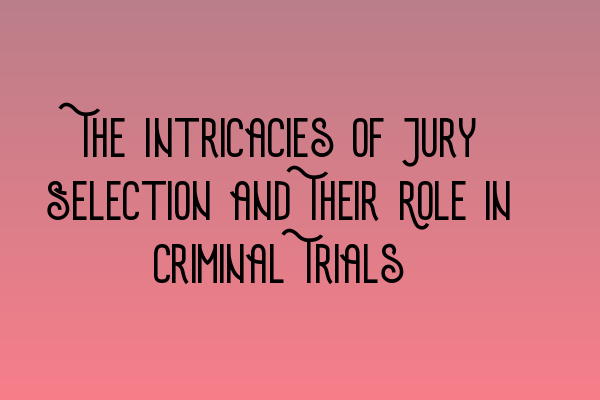The Intricacies of Jury Selection and Their Role in Criminal Trials
When it comes to criminal trials, one key component that can greatly influence the outcome is the process of jury selection. Jury selection plays a critical role in ensuring a fair and impartial trial, as it determines who will be responsible for examining the evidence and ultimately deciding the fate of the accused.
The Importance of Jury Selection
Effective jury selection involves carefully considering various factors to assemble a diverse and unbiased group of individuals who can objectively evaluate the evidence presented during the trial. The goal is to create a jury that will fairly assess the facts, follow the law, and deliver a just verdict.
During the jury selection process, both the defense and the prosecution have the opportunity to question potential jurors to assess their suitability for the case. They may inquire about the juror’s background, personal beliefs, biases, and any potential conflicts of interest that could affect their ability to remain impartial.
To ensure a fair trial, it is important to eliminate any potential jurors who may have preconceived notions or biases that could influence their decision-making. This is why both sides are given the chance to challenge and strike potential jurors from the panel. It is crucial to identify individuals who may be unable to set aside personal biases and approach the case with an open mind.
Considerations in Jury Selection
There are several key considerations to keep in mind during the jury selection process:
- Demographics: It is important to have a diverse jury that reflects the community where the trial is taking place. This ensures different perspectives and reduces the risk of bias.
- Occupation and Background: Understanding the occupation and background of potential jurors can provide insights into their experiences and potential biases.
- Attitudes and Prejudices: Exploring the attitudes and prejudices that potential jurors may hold can help identify any potential biases that could impact their decision-making.
- Communication and Listening Skills: Assessing the communication and listening skills of potential jurors is crucial, as they will need to understand complex legal arguments and accurately evaluate evidence.
These considerations, among others, help attorneys determine whether a potential juror is suited for a particular case. It is crucial to identify any biases or predispositions that might hinder a juror’s ability to render an unbiased verdict.
Effectiveness of Jury Selection
While jury selection is intended to ensure a fair trial, it is not a foolproof process. It is challenging to predict how a juror will react to the evidence presented in court, and biases can sometimes influence juror decision-making despite efforts to select an impartial jury.
However, attorneys rely on their experience, legal knowledge, and techniques such as striking potential jurors and employing peremptory challenges to increase the chances of assembling a fair and unbiased jury panel.
If you are interested in learning more about criminal law and the legal profession, SQE Criminal Law & Practice Law UK provides comprehensive courses to help you prepare for the Solicitors Qualifying Examination. You may also find the following articles helpful:
- SQE 1 Practice Exam Questions
- SQE 1 Practice Mocks FLK1 FLK2
- SQE 2 Preparation Courses
- SQE 1 Preparation Courses
- SRA SQE Exam Dates
By staying up to date with legal developments and participating in comprehensive education programs, you can enhance your knowledge and skills in the field of criminal law.
Overall, jury selection is a crucial process that requires a careful evaluation of potential jurors to ensure a fair and impartial trial. Attorneys must consider various factors to identify any biases and prejudice that may hinder a juror’s ability to objectively evaluate the evidence presented. While not perfect, the process of jury selection plays a vital role in maintaining the integrity of the criminal justice system.
